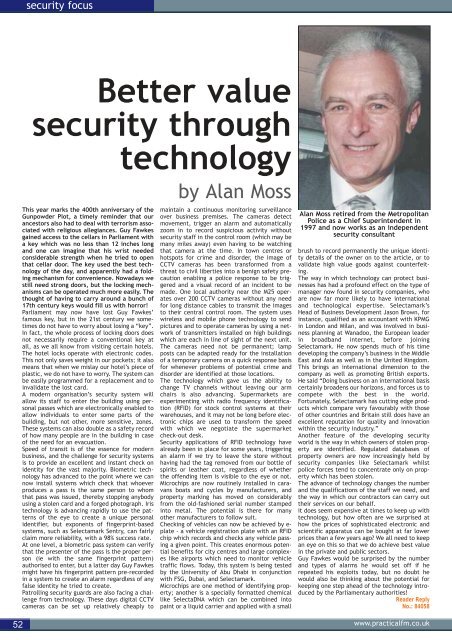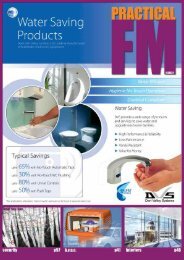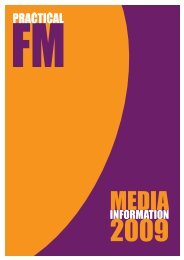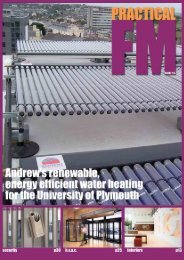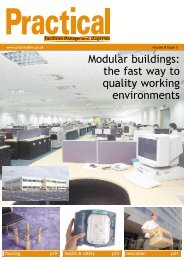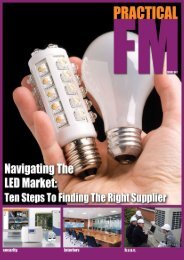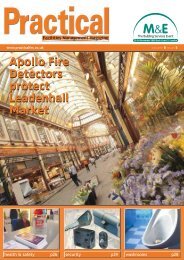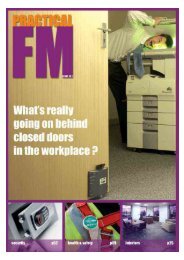Where are your priorities? - Practical Facilities Management
Where are your priorities? - Practical Facilities Management
Where are your priorities? - Practical Facilities Management
Create successful ePaper yourself
Turn your PDF publications into a flip-book with our unique Google optimized e-Paper software.
security focus<br />
Better value<br />
security through<br />
technology<br />
by Alan Moss<br />
52<br />
This year marks the 400th anniversary of the<br />
Gunpowder Plot, a timely reminder that our<br />
ancestors also had to deal with terrorism associated<br />
with religious allegiances. Guy Fawkes<br />
gained access to the cellars in Parliament with<br />
a key which was no less than 12 inches long<br />
and one can imagine that his wrist needed<br />
considerable strength when he tried to open<br />
that cellar door. The key used the best technology<br />
of the day, and app<strong>are</strong>ntly had a folding<br />
mechanism for convenience. Nowadays we<br />
still need strong doors, but the locking mechanisms<br />
can be operated much more easily. The<br />
thought of having to carry around a bunch of<br />
17th century keys would fill us with horror!<br />
Parliament may now have lost Guy Fawkes’<br />
famous key, but in the 21st century we sometimes<br />
do not have to worry about losing a “key”.<br />
In fact, the whole process of locking doors does<br />
not necessarily require a conventional key at<br />
all, as we all know from visiting certain hotels.<br />
The hotel locks operate with electronic codes.<br />
This not only saves weight in our pockets; it also<br />
means that when we mislay our hotel’s piece of<br />
plastic, we do not have to worry. The system can<br />
be easily programmed for a replacement and to<br />
invalidate the lost card.<br />
A modern organisation’s security system will<br />
allow its staff to enter the building using personal<br />
passes which <strong>are</strong> electronically enabled to<br />
allow individuals to enter some parts of the<br />
building, but not other, more sensitive, zones.<br />
These systems can also double as a safety record<br />
of how many people <strong>are</strong> in the building in case<br />
of the need for an evacuation.<br />
Speed of transit is of the essence for modern<br />
business, and the challenge for security systems<br />
is to provide an excellent and instant check on<br />
identity for the vast majority. Biometric technology<br />
has advanced to the point where we can<br />
now install systems which check that whoever<br />
produces a pass is the same person to whom<br />
that pass was issued, thereby stopping anybody<br />
using a stolen card and a forged photograph. Iris<br />
technology is advancing rapidly to use the patterns<br />
of the eye to create a unique personal<br />
identifier, but exponents of fingerprint-based<br />
systems, such as Selectamark Sentry, can fairly<br />
claim more reliability, with a 98% success rate.<br />
At one level, a biometric pass system can verify<br />
that the presenter of the pass is the proper person<br />
(ie with the same fingerprint pattern)<br />
authorised to enter, but a latter day Guy Fawkes<br />
might have his fingerprint pattern pre-recorded<br />
in a system to create an alarm regardless of any<br />
false identity he tried to create.<br />
Patrolling security guards <strong>are</strong> also facing a challenge<br />
from technology. These days digital CCTV<br />
cameras can be set up relatively cheaply to<br />
maintain a continuous monitoring surveillance<br />
over business premises. The cameras detect<br />
movement, trigger an alarm and automatically<br />
zoom in to record suspicious activity without<br />
security staff in the control room (which may be<br />
many miles away) even having to be watching<br />
that camera at the time. In town centres or<br />
hotspots for crime and disorder, the image of<br />
CCTV cameras has been transformed from a<br />
threat to civil liberties into a benign safety precaution<br />
enabling a police response to be triggered<br />
and a visual record of an incident to be<br />
made. One local authority near the M25 operates<br />
over 200 CCTV cameras without any need<br />
for long distance cables to transmit the images<br />
to their central control room. The system uses<br />
wireless and mobile phone technology to send<br />
pictures and to operate cameras by using a network<br />
of transmitters installed on high buildings<br />
which <strong>are</strong> each in line of sight of the next unit.<br />
The cameras need not be permanent; lamp<br />
posts can be adapted ready for the installation<br />
of a temporary camera on a quick response basis<br />
for whenever problems of potential crime and<br />
disorder <strong>are</strong> identified at those locations.<br />
The technology which gave us the ability to<br />
change TV channels without leaving our arm<br />
chairs is also advancing. Supermarkets <strong>are</strong><br />
experimenting with radio frequency identification<br />
(RFID) for stock control systems at their<br />
w<strong>are</strong>houses, and it may not be long before electronic<br />
chips <strong>are</strong> used to transform the speed<br />
with which we negotiate the supermarket<br />
check-out desk.<br />
Security applications of RFID technology have<br />
already been in place for some years, triggering<br />
an alarm if we try to leave the store without<br />
having had the tag removed from our bottle of<br />
spirits or leather coat, regardless of whether<br />
the offending item is visible to the eye or not.<br />
Microchips <strong>are</strong> now routinely installed in caravans<br />
boats and cycles by manufacturers, and<br />
property marking has moved on considerably<br />
from the old-fashioned serial number stamped<br />
into metal. The potential is there for many<br />
other manufacturers to follow suit.<br />
Checking of vehicles can now be achieved by e-<br />
plate - a vehicle registration plate with an RFID<br />
chip which records and checks any vehicle passing<br />
a given point. This creates enormous potential<br />
benefits for city centres and large complexes<br />
like airports which need to monitor vehicle<br />
traffic flows. Today, this system is being tested<br />
by the University of Abu Dhabi in conjunction<br />
with FSG, Dubai, and Selectamark.<br />
Microchips <strong>are</strong> one method of identifying property;<br />
another is a specially formatted chemical<br />
like SelectaDNA which can be combined into<br />
paint or a liquid carrier and applied with a small<br />
Alan Moss retired from the Metropolitan<br />
Police as a Chief Superintendent in<br />
1997 and now works as an independent<br />
security consultant<br />
brush to record permanently the unique identity<br />
details of the owner on to the article, or to<br />
validate high value goods against counterfeiting.<br />
The way in which technology can protect businesses<br />
has had a profound effect on the type of<br />
manager now found in security companies, who<br />
<strong>are</strong> now far more likely to have international<br />
and technological expertise. Selectamark’s<br />
Head of Business Development Jason Brown, for<br />
instance, qualified as an accountant with KPMG<br />
in London and Milan, and was involved in business<br />
planning at Wanadoo, the European leader<br />
in broadband internet, before joining<br />
Selectamark. He now spends much of his time<br />
developing the company’s business in the Middle<br />
East and Asia as well as in the United Kingdom.<br />
This brings an international dimension to the<br />
company as well as promoting British exports.<br />
He said “Doing business on an international basis<br />
certainly broadens our horizons, and forces us to<br />
compete with the best in the world.<br />
Fortunately, Selectamark has cutting edge products<br />
which comp<strong>are</strong> very favourably with those<br />
of other countries and Britain still does have an<br />
excellent reputation for quality and innovation<br />
within the security industry.”<br />
Another feature of the developing security<br />
world is the way in which owners of stolen property<br />
<strong>are</strong> identified. Regulated databases of<br />
property owners <strong>are</strong> now increasingly held by<br />
security companies like Selectamark whilst<br />
police forces tend to concentrate only on property<br />
which has been stolen.<br />
The advance of technology changes the number<br />
and the qualifications of the staff we need, and<br />
the way in which our contractors can carry out<br />
their services on our behalf.<br />
It does seem expensive at times to keep up with<br />
technology, but how often <strong>are</strong> we surprised at<br />
how the prices of sophisticated electronic and<br />
scientific apparatus can be bought at far lower<br />
prices than a few years ago? We all need to keep<br />
an eye on this so that we do achieve best value<br />
in the private and public sectors.<br />
Guy Fawkes would be surprised by the number<br />
and types of alarms he would set off if he<br />
repeated his exploits today, but no doubt he<br />
would also be thinking about the potential for<br />
keeping one step ahead of the technology introduced<br />
by the Parliamentary authorities!<br />
Reader Reply<br />
No.: 84058<br />
www.practicalfm.co.uk


